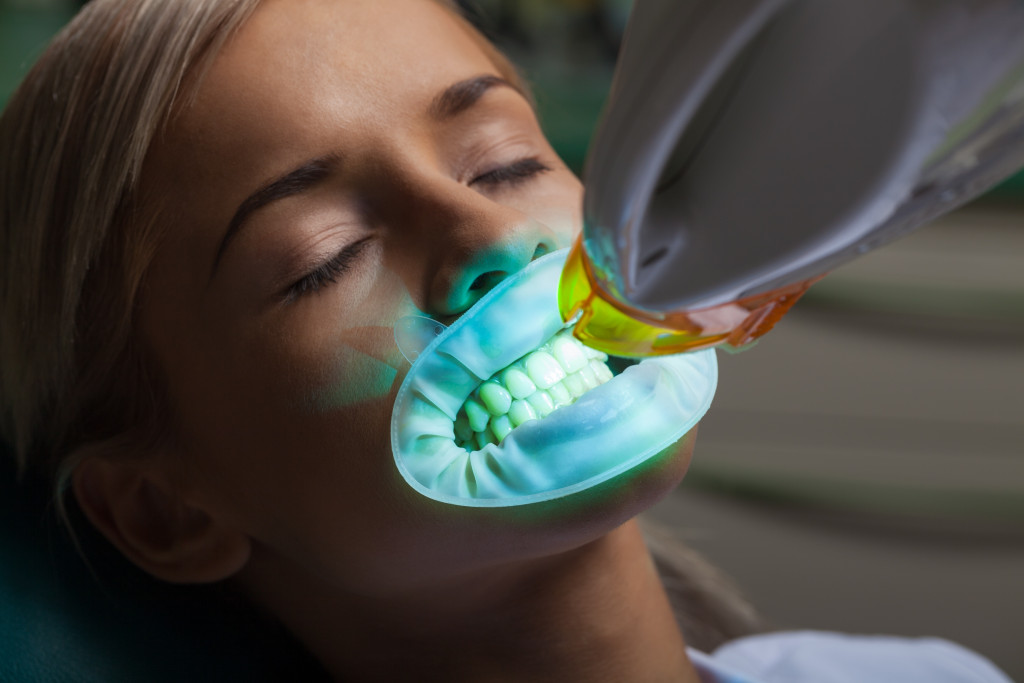Disclaimer: This website provides health information for educational purposes only and is not a substitute for professional medical advice, diagnosis, or treatment. Always seek the guidance of a qualified healthcare provider with any questions you may have.
Many people suffer from tooth stains, which can be embarrassing and difficult to eliminate. In most cases, teeth discoloration can even affect a person’s self-esteem, which is why it is important to understand what causes teeth stains and how to treat them. There are many causes of tooth stains, but the good news is that many treatments are available. In this blog post, we will explore the causes of teeth stains as well as some of the best remedies for getting rid of them.
Types of teeth stains
Other types of teeth stains can be more challenging to get rid of. Let’s look at three of the most common teeth stains and offer some tips for removing them.
Extrinsic Stains
These are the most common type of teeth stains and are typically caused by smoking, drinking coffee or tea, or eating certain foods (berries, soy sauce, and curry). Extrinsic stains can usually be removed with regular brushing and flossing. If your extrinsic stains are particularly stubborn, you may want to try using a whitening toothpaste or whitening strips.
Intrinsic Stains
These stains are found within the tooth itself. They are often caused by excessive fluoride exposure during childhood, certain medications (such as tetracycline), or trauma to the tooth. Intrinsic stains generally cannot be removed with regular brushing and flossing; instead, you’ll need to see a dentist for professional treatment.
Dental Fluorosis
Dental fluorosis is a condition that results in white spots on the teeth due to excessive fluoride exposure during childhood. Although dental fluorosis is not technically a “stain,” it can still mar the appearance of your smile. The best way to prevent dental fluorosis is by ensuring that your child does not ingest too much fluoride during their formative years. If your child already has dental fluorosis, your dentist may be able to help improve the appearance of their teeth with cosmetic treatments such as bonding or veneers.
Causes
Many different things can cause teeth stains. Some common causes include:
- Drinking coffee, tea, or red wine. These beverages can all lead to staining because they contain chromogens, which are pigments that attach to the enamel on your teeth and cause staining.
- Smoking cigarettes or using other tobacco products. The nicotine in tobacco products can cause staining, as well as the tar that is emitted when smoking.
- Poor dental hygiene. If you don’t brush and floss regularly, food and bacteria can build up on your teeth and cause staining.
Treatments
Once you know what is causing your teeth stains, you can begin to treat them. Some popular treatments include:
Professional teeth whitening

When it comes to removing difficult stains from your teeth, professional teeth whitening at a reputable dental clinic is the safest and most effective option. Over-the-counter products often contain lower concentrations of bleaching agents, leading to slow and inconsistent results. But in a professional setting, your dentist can provide higher levels of bleaching agents tailored to your individual needs. This means faster and longer-lasting results, with minimal sensitivity or irritation.
In addition, a dental clinic will have the necessary training and equipment to ensure the procedure is properly performed and monitored. So if you’re looking for an effective solution for stained teeth, don’t compromise with over-the-counter options – trust a reputable dental clinic for professional teeth whitening.
Over-the-counter whitening kits
Many individuals want to achieve the perfect smile with pearly whites, and over-the-counter whitening kits can seem like a quick and easy solution. However, these kits are not without their potential risks and drawbacks. Firstly, it is important to note that over-the-counter whitening kits may not be as effective as professional whitening treatments. Additionally, these kits can sometimes cause damage to tooth enamel or result in uneven whitening if not used properly. It is always recommended that individuals consult with their dentist before starting any at-home whitening routine.
In some cases, the underlying reason for teeth discoloration may require more specialized treatment than simple whitening can provide. In short, while over-the-counter whitening kits may offer convenience and affordability, they may not ultimately give you the results you desire and could potentially harm your oral health.
The bottom line
No one likes having stained teeth, but luckily there are plenty of treatments available to help you achieve a brighter smile. If you are struggling with stained teeth, talk to your dentist about professional whitening treatments or try an over-the-counter whitening kit. With any treatment, be sure to follow directions carefully and always consult with your dentist before starting any new oral care routine. With these tips, you should be on your way to achieving brighter, whiter teeth in no time.




